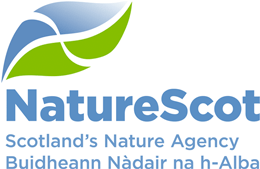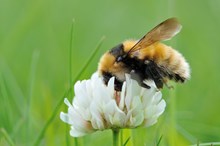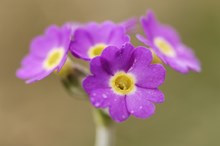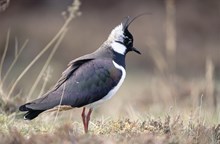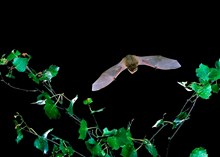29 June, 2022
£4.2m lifeline for Scotland’s most vulnerable species
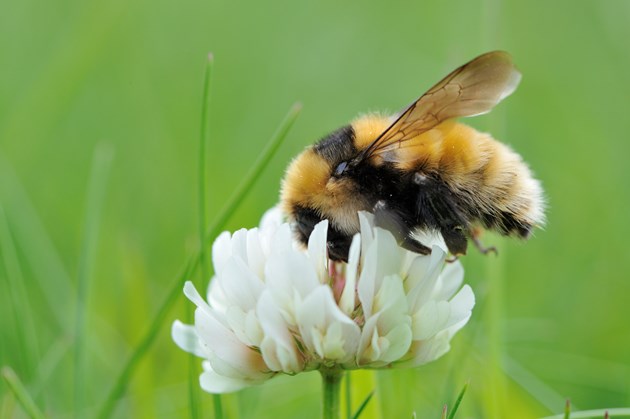
Threatened species in Scotland have today received a £4.2m lifeline from The National Lottery Heritage Fund.
The funding will support urgent action to help save 37 of Scotland’s most vulnerable coastal and island species, including the Great Yellow bumblebee, Scottish primrose and little tern.
NatureScot received the £4,232,000 award for its ground-breaking Species on the Edge partnership project with Amphibian and Reptile Conservation, The Bat Conservation Trust, Buglife, the Bumblebee Conservation Trust, Butterfly Conservation, Plantlife Scotland and RSPB Scotland.
The four-and-a-half year programme will support seven project areas, from the Solway to Shetland and from the East Coast to the Outer Hebrides, benefitting species including midge-munching soprano pipistrelles, vital pollinators like the Great Yellow bumblebee, rare amphibians such as the natterjack toad, wading birds including terns, lapwings and curlews and the ‘jewel of the north’, the Scottish primrose.
Working with some of Scotland’s most geographically remote and diverse communities, the partnership will draw on their expert scientific knowledge, local networks and unparalleled experience to create opportunities for people and communities to get more involved in protecting local wildlife. This will provide a vital lifeline for some of our most nationally vulnerable and internationally important coast and island flora and fauna.
The State of Nature Scotland Report 2019 showed that, from 1994 to 2016, 49% of Scottish species have decreased. Of the 6,413 species found in Scotland that have been assessed, 11% have been classified as threatened with extinction. Species on the Edge will work as part of action urgently required to halt further losses by 2030 and restore and regenerate nature by 2045.
Of the 37 species targeted by the project, 19 are threatened by land use change, eight from climate change and the remainder through a combination of influences such as pollution, invasive non-native species and exploitation.
Francesca Osowska, NatureScot’s Chief Executive, said:
“Scotland’s biodiversity is in decline and, combined with the climate emergency, some of our most vulnerable species are now on the brink of extinction. Their survival isn’t just important for conservation. Biodiversity loss is a global threat to human wellbeing so it’s vital we take action to halt this decline now.
“Species on the Edge is one of the UK’s most ambitious nature projects and an essential part of our response to the nature and climate crises. We are incredibly grateful to receive this support today from the National Lottery Heritage Fund.
“This funding will support our work to boost Scotland’s species recovery, combining knowledge, expertise and resources to protect, restore and enhance Scotland’s nature for future generations.”
Caroline Clark, Scotland Director, The National Lottery Heritage Fund, said:
“Scotland’s coastline is dramatic, rugged, wild and beautiful. At the same time it is home to a fragile ecology, a natural heritage that we have a duty to protect.
“I am delighted that thanks to National Lottery Players we are able fund Species on the Edge. NatureScot and their partners bring huge amounts of expertise, experience and enthusiasm to this ambitious project to safeguard and encourage some of our most vulnerable coastal inhabitants.”
In addition to the £4.2m The National Lottery Heritage Fund award announced today, Species on the Edge is receiving £500k from the Scottish Government, £133,136 from The Esmée Fairbairn Foundation, £120,000 from the Dulverton Trust and £30,000 from the Banister Trust.
Contact information
- Name
- NatureScot Media
- Telephone
- 0131 316 2655
- media@nature.scot
Notes to editors
The State of Nature Scotland Report 2019 - https://www.nature.scot/doc/state-nature-scotland-report-2019
The Amphibian and Reptile Conservation Trust (ARC) is a national wildlife charity focusing on toads, frogs, newts, snakes, lizards and marine turtles. ARC conserves amphibians and reptiles, and the habitats on which they depend, to protect them for future generations. The Trust runs species recovery programmes, monitoring, scientific research, advocacy, outreach and regional projects. ARC owns 24 nature reserves and manages 80, covering 1,900 hectares, and works with a wide range of partner organisations, volunteers and specialists. ARC continues a 50-year history of reptile and amphibian conservation. The charity was established in June 2009 by the Herpetological Conservation Trust (HCT), which was formed in 1989. HCT grew out of the British Herpetological Society’s Conservation Committee, formed in 1969. For more information visit www.arc-trust.org
The Bat Conservation Trust is the leading non-governmental organisation in the United Kingdom solely devoted to the conservation of bats and the landscapes on which they rely. The breadth and depth of our work is driven by our vision of a world rich in wildlife where bats and people thrive together. Through monitoring and direct conservation action we can secure the future of our 10 species of bat in Scotland.
Buglife is the only charity in Europe devoted to the conservation of all invertebrates. Our aim is to halt the extinction of invertebrate species and to achieve sustainable populations of invertebrates across the UK. We are working hard to achieve this through: Undertaking practical conservation projects that will contribute to achieving our aim. Promoting the environmental importance of invertebrates and raising awareness about the challenges to their survival. Assisting in the development of legislation and policy that will ensure the conservation of invertebrates. Developing and disseminating knowledge about how to conserve invertebrates. Encouraging and supporting invertebrate conservation initiatives by other organisations in the UK, Europe and worldwide. Further information is available on Buglife’s website at www.buglife.org.uk.
The Bumblebee Conservation Trust is a UK based charity that was established because of serious concerns about the ‘plight of the bumblebee’. In the last 80 years bumblebee populations have crashed and two bumblebee species have become extinct in the UK. The Trust carries out science, conservation, and engagement work across the UK www.bumblebeeconservation.org.
Butterfly Conservation is the UK charity dedicated to saving butterflies, moths and our environment. Our research provides advice on how to conserve and restore habitats. We run projects to protect more than 100 threatened species and we are involved in conserving hundreds of sites and reserves across the UK. BC has more than 2200 members living in Scotland where we work closely with local communities, landowners, the Scottish Government, Scottish Natural Heritage and other conservation partners, to safeguard Scotland’s butterflies, moths and their habitats. www.butterfly-conservation.org/scotland @savebutterflies
Plantlife is the organisation which stands up for wild plants and fungi. We work with land managers, government, business, local communities and partner conservation organisations to save our threatened wild plants and fungi. We conserve and restore native plant diversity, develop and lead restoration programmes, work with citizen scientists and academics to build a body of evidence, and campaign for better protection and conservation for wild plants and fungi. See www.plantlife.org.uk for more information.
RSPB Scotland is part of the RSPB, the UK’s largest nature conservation charity, inspiring everyone to give nature a home. Together with our partners, we protect threatened birds and wildlife so our towns, coast and countryside will teem with life once again. We play a leading role in BirdLife International, a worldwide partnership of nature conservation organisations.
NatureScot is Scotland's nature agency. We work to enhance our natural environment in Scotland and inspire everyone to care more about it. Our priority is a nature-rich future for Scotland and an effective response to the climate emergency. For more information, visit our website at www.nature.scot or follow us on X at https://x.com/NatureScot
’S e NatureScot buidheann nàdair na h-Alba. Bidh sinn a’ neartachadh àrainneachd na h-Alba agus a’ brosnachadh dhaoine gu barrachd suim a chur ann an nàdar. Tha e mar phrìomhachas againn gum bi nàdar na h-Alba beairteach agus gun dèilig sinn gu h-èifeachdach le èiginn na gnàth-shìde. Tha an tuilleadh fiosrachaidh aig www.nature.scot no air X aig https://x.com/NatureScot
